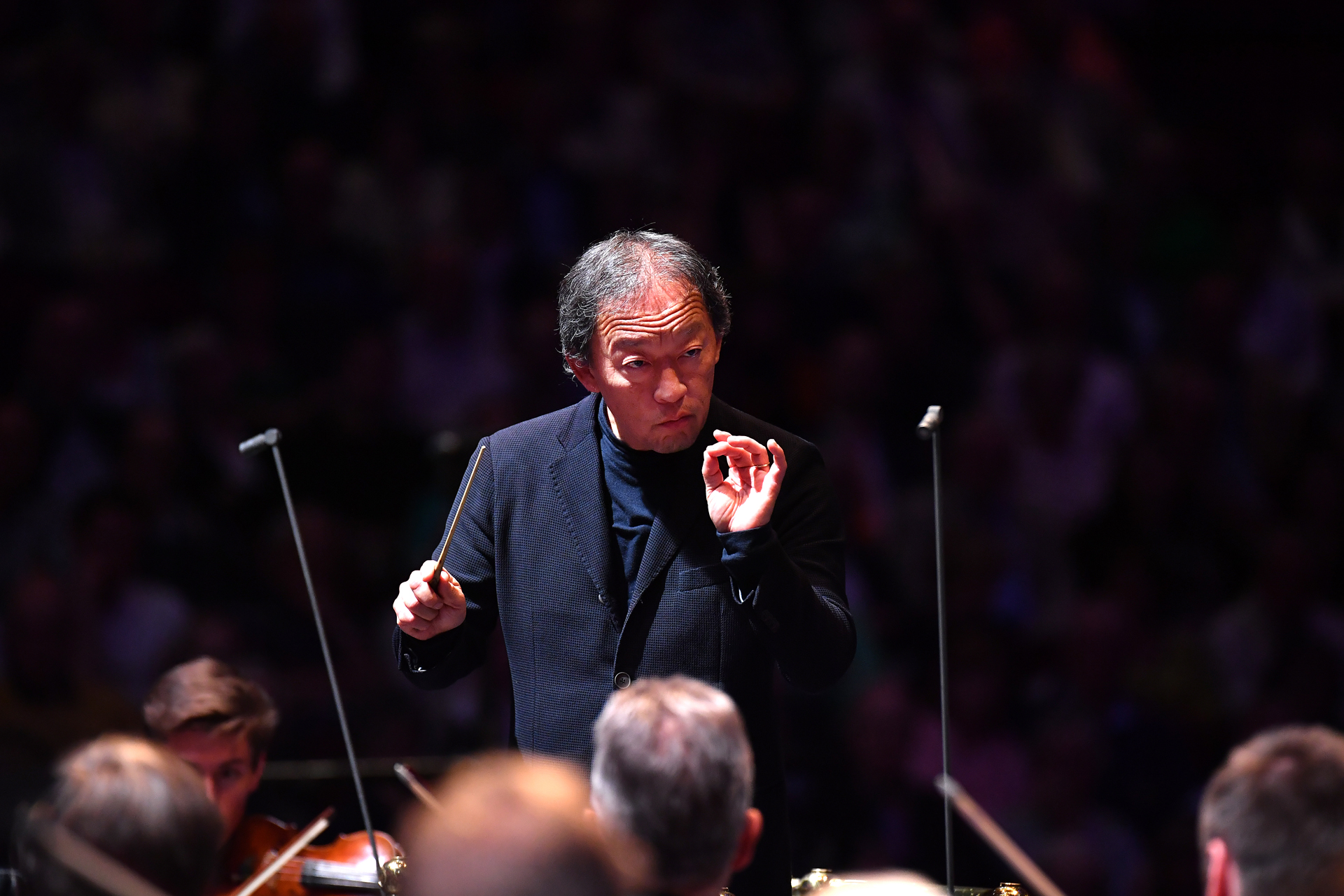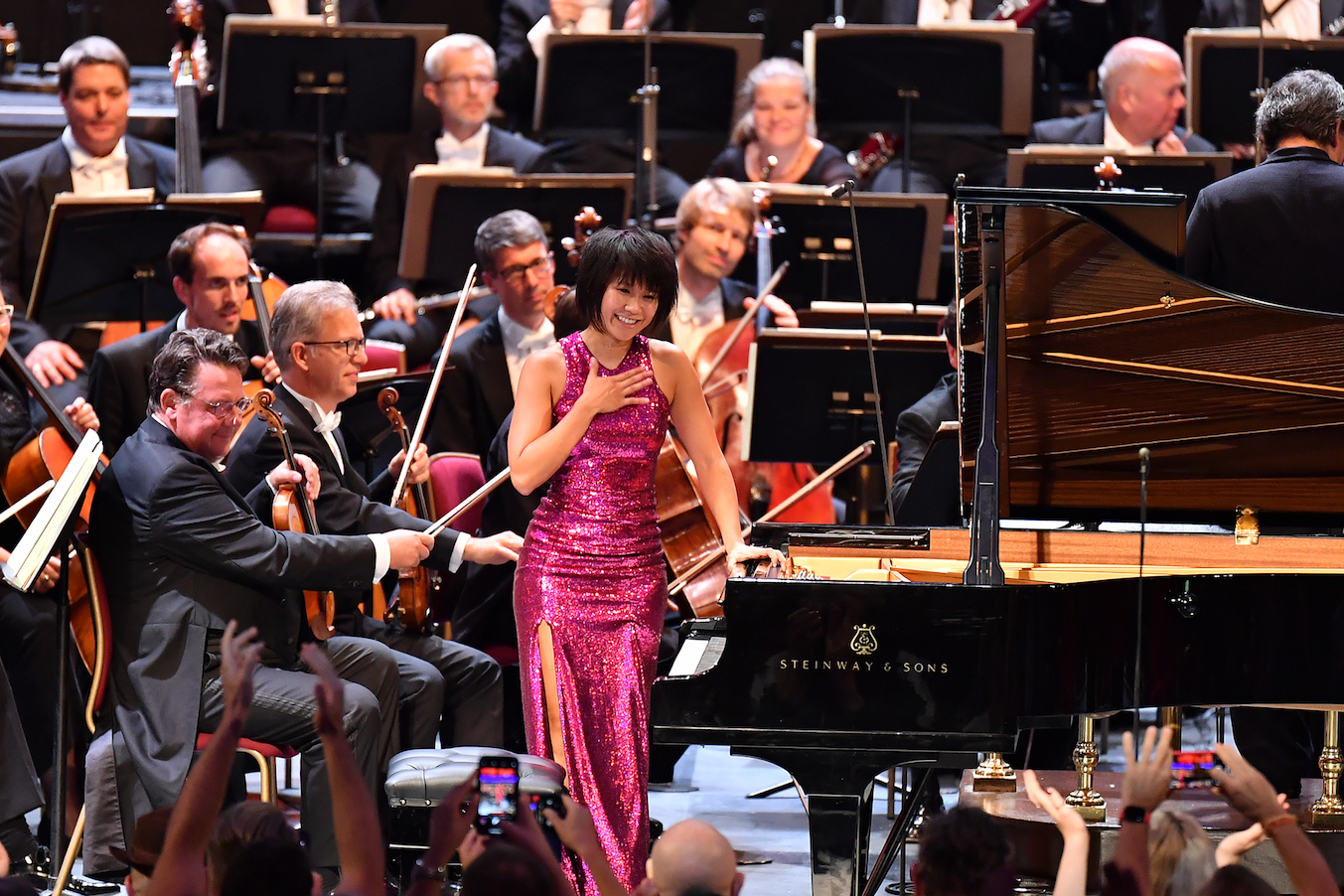Prom 63: Wang, Staatskapelle Dresden, Chung review – private passions | reviews, news & interviews
Prom 63: Wang, Staatskapelle Dresden, Chung review – private passions
Prom 63: Wang, Staatskapelle Dresden, Chung review – private passions
An intimate journey through a showpiece concerto
Weirdly enough, it was “Tea for Two” that definitively proved her class for me.
That “Tea for Two” showed in miniature that even seeming frivolity calls for utter commitment, and that fun means nothing without art. No more does brooding, yearning introspection or melodramatic passion in music make its case alone. Wang’s remarkable advocacy of Rachmaninov’s Third owed nothing to corny and overwrought pianistic gestures, and everything to a quiet, sustained artistry. She looked for and found an ever-shifting palette of colours in music that has much more to offer than shades of the deepest Russian blue. Indeed, as the visiting Staatskapelle Dresden began their journey with Wang, I worried that the orchestra’s principal guest conductor Myung-Whun Chung might allow his deep-voiced, big-shouldered band to speak a bit too forcefully on its own account. Inward, meditative, the absolute opposite of some stadium-pleasing crasher, Wang took a while to hold her own against the sumptuous strings and polished, poised brass (those horns!) of the commanding Dresdeners.

Some of the dialogues with horns and woods – especially in the “alla breve” finale – were simply exquisite in their tenderly assured to-and-fro. Dreamily expressive rather than heroically declamatory, Wang rippled rather than splashed through the extended cadenzas. Meanwhile, the episodic voyage of the finale does – at least as she plays it – bring to mind the quicksilver wanderings of a Lisztian pilgrimage, rather than a stereotypical dose of Russian soul. Yes, the climax delivered a gloriously bold farewell from both piano and orchestra. But the more elusive, intimate aspects of this performance really made it special. Wang has a very public face – but, in this work anyway, a beautifully private musical voice.

The long, finely sculpted phrases of the Adagio never lost their direction, while the third-movement dance remained “Grazioso” rather than merely rustic. Outstanding throughout, Erich Markwart and his fellow horns sang in even warmer tones through the finale, while flute (Sabine Kittel) and clarinet (Wolfram Grosse) made some delicious interventions. You would probably have to look beyond Dresden for radical, mould-breaking Brahms. Last night, though, gave us a supremely satisfying account of a (rare) happy masterpiece. And the Staatskapelle’s encore of a Hungarian Dance showed that they too can mix consummate skill with straightforward joy.
rating
Explore topics
Share this article
Add comment
The future of Arts Journalism
You can stop theartsdesk.com closing!
We urgently need financing to survive. Our fundraising drive has thus far raised £49,000 but we need to reach £100,000 or we will be forced to close. Please contribute here: https://gofund.me/c3f6033d
And if you can forward this information to anyone who might assist, we’d be grateful.

Subscribe to theartsdesk.com
Thank you for continuing to read our work on theartsdesk.com. For unlimited access to every article in its entirety, including our archive of more than 15,000 pieces, we're asking for £5 per month or £40 per year. We feel it's a very good deal, and hope you do too.
To take a subscription now simply click here.
And if you're looking for that extra gift for a friend or family member, why not treat them to a theartsdesk.com gift subscription?
more Classical music
 Hallé John Adams festival, Bridgewater Hall / RNCM, Manchester review - standing ovations for today's music
From 1980 to 2025 with the West Coast’s pied piper and his eager following
Hallé John Adams festival, Bridgewater Hall / RNCM, Manchester review - standing ovations for today's music
From 1980 to 2025 with the West Coast’s pied piper and his eager following
 Kaploukhii, Greenwich Chamber Orchestra, Cutts, St James's Piccadilly review - promising young pianist
A robust and assertive Beethoven concerto suggests a player to follow
Kaploukhii, Greenwich Chamber Orchestra, Cutts, St James's Piccadilly review - promising young pianist
A robust and assertive Beethoven concerto suggests a player to follow
 Robin Holloway: Music's Odyssey review - lessons in composition
Broad and idiosyncratic survey of classical music is insightful but slightly indigestible
Robin Holloway: Music's Odyssey review - lessons in composition
Broad and idiosyncratic survey of classical music is insightful but slightly indigestible
 Classical CDs: Wolf-pelts, clowns and social realism
British ballet scores, 19th century cello works and contemporary piano etudes
Classical CDs: Wolf-pelts, clowns and social realism
British ballet scores, 19th century cello works and contemporary piano etudes
 Bizet in 150th anniversary year: rich and rare French offerings from Palazzetto Bru Zane
Specialists in French romantic music unveil a treasure trove both live and on disc
Bizet in 150th anniversary year: rich and rare French offerings from Palazzetto Bru Zane
Specialists in French romantic music unveil a treasure trove both live and on disc
 Scottish Chamber Orchestra, Ibragimova, Queen’s Hall, Edinburgh review - rarities, novelties and drumrolls
A pity the SCO didn't pick a better showcase for a shining guest artist
Scottish Chamber Orchestra, Ibragimova, Queen’s Hall, Edinburgh review - rarities, novelties and drumrolls
A pity the SCO didn't pick a better showcase for a shining guest artist
 Kilsby, Parkes, Sinfonia of London, Wilson, Barbican review - string things zing and sing in expert hands
British masterpieces for strings plus other-worldly tenor and horn - and a muscular rarity
Kilsby, Parkes, Sinfonia of London, Wilson, Barbican review - string things zing and sing in expert hands
British masterpieces for strings plus other-worldly tenor and horn - and a muscular rarity
 From Historical to Hip-Hop, Classically Black Music Festival, Kings Place review - a cluster of impressive stars for the future
From quasi-Mozartian elegance to the gritty humour of a kitchen inspection
From Historical to Hip-Hop, Classically Black Music Festival, Kings Place review - a cluster of impressive stars for the future
From quasi-Mozartian elegance to the gritty humour of a kitchen inspection
 Shibe, LSO, Adès, Barbican review - gaudy and glorious new music alongside serene Sibelius
Adès’s passion makes persuasive case for the music he loves, both new and old
Shibe, LSO, Adès, Barbican review - gaudy and glorious new music alongside serene Sibelius
Adès’s passion makes persuasive case for the music he loves, both new and old
 Anja Mittermüller, Richard Fu, Wigmore Hall review - a glorious hall debut
The Austrian mezzo shines - at the age of 22
Anja Mittermüller, Richard Fu, Wigmore Hall review - a glorious hall debut
The Austrian mezzo shines - at the age of 22
 First Person: clarinettist Oliver Pashley on the new horizons of The Hermes Experiment's latest album
Compositions by members of this unusual quartet feature for the first time
First Person: clarinettist Oliver Pashley on the new horizons of The Hermes Experiment's latest album
Compositions by members of this unusual quartet feature for the first time

Comments
Chaqun a son goût. But I
I’d love to hear your version
That's beside the point. What